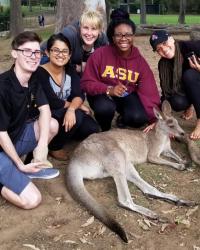Why Study Abroad With Us?
Students often cite studying abroad as the highlight of their academic career and a crucial moment in helping them gain a clearer view of the world, its peoples and the complex challenges facing us all.
The School of Human Evolution and Social Change offers a suite of faculty-directed study abroad programs designed to connect students with real-life issues that impact local communities, transect borders, and create lifelong memories alongside personal and professional growth.
The experiences of our previous students - Study Abroad Experiences
Watch now: 2026 Study Abroad Info Session
Global health students, check with your advisor to see if these programs satisfy your global health study abroad requirement.
Programs By Major
Scholarships available
Apply for a scholarship from the school to attend a faculty-led study abroad program. The scholarship eligible programs are below. Scholarships range from $250-$1,000. Scholarship applications are due by the program application deadline.
Summer 2026
London
Plague Pits and Body Snatchers: History of Health and Disease in a Global City
May 26 - June 17, 2026
This trans-disciplinary program explores London, and the surrounding areas, to study how people of the region lived and died through the lens of global health and bioarchaeology. The emphasis is on the city as our classroom, exploring castles, museums, streets and parks to discover how the city's past and present are connected. Students will also participate in a unique behind the scenes tour of the British Museum, featuring the museum's skeletal collection, and a river tour of the Thames. Other highlights will include visits to Highgate Cemetery, the Wellcome Collection and walking tours in the footsteps of deadly diseases, such as the bubonic plague and cholera. Participants will earn 6 credits.
Australia
ONE HEALTH in Australia: Community Care and Ecosystem Sustainability
June 2 - 24, 2026
This six credit traveling program visits Queensland, Northern Territory and New South Wales spending four weeks getting to know urban, mangrove, rainforest, reef, beach and outback landscapes across Australia. Learn how 200 years of colonization and more recent processes of urbanization and globalization have brought massive enviornmental, social and political changes to the continent with critical implications for its future sustainability. Students will explore 15 ecosystems - included five World Heritage Sites - multiple health centers, and visit with dozens of diverse stakeholders to understand complex interaction among people, their communities and environments.
France
Food, Culture and Health in France
June 1 - 19, 2026
In this immersive, hands-on program we learn about how we create ourselves and our societies through food. We ask: What do we eat, and why? Who defines what is valuable, meaningful, or healthy food? How are food production, history, culture, and environment tied together? How does food define and reflect who we are? We discover answers by exploring rural and urban foods, eating, and food production in France and nearby Germany and Switzerland.
Field Schools

Summer 2026
Peru - Archaeological Field School
Summer 2026 Dates: June 21 - July 26, 2026
Faculty Director: Donna Nash
Experience real archaeology in the Andean foothills of southern Peru. Between 600 and 700 CE, a multi-ethnic colony was established at Cerro Mejía on the frontier shared by two powerful states, Wari and Tiwanaku. The settlers were relocated to the upper drainage of Moquegua from other areas of the valley and several distant provinces as part of a Wari-sponsored colony. Many centuries later, archaeologists are excavating the ruins of these migrants’ houses to understand their daily lives, how these people coped with their new foreign surroundings, and what features of their lives changed as Wari imperial subjects. You can join the project. As a member of the research team you will learn the basics of mapping, survey, excavation, collections management, and aspects of preliminary artifact analysis.

Community Health and Medical Anthropology in Guatemala
This program is not being offered for the Summer 2026, but stay tuned for future sessions!
Faculty Director Jonathan Maupin
This field school is led by Dr. Jonathan Maupin, one of SHESC's top medical anthropologists. Students will benefit from his extensive research experience focusing on issues of community participation in health programs, variation in illness concepts, and cultural competency among the Kaqchikel Maya in Guatemala. Students will participate in research projects with individual households and local schools that focus on community health issues, such as food insecurity, body image, and reproductive health. Students will also visit different healthcare providers in urban and rural settings, including the government health system, non-governmental organizations, and indigenous Maya healers.


